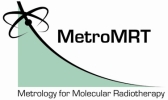The Project
What is the problem with molecular radiotherapy?
The medical treatment modality of molecular radiotherapy (MRT), or nuclear medicine therapy, has been used for many decades for treating both benign and malignant diseases. However, from the start, treatment was based on the administration of a measured activity of radioactive material in a form taken up in the tissue to be treated. It is now clear that, for a given administered activity, the quantity taken up, and hence the therapeutic radiation dose to the tissue, varies widely among individuals. Recent research and new technology developments have permitted estimates of radiation doses on individual patients both to target tissues and critical normal tissues at risk. But there has been almost no adoption of these methodologies into routine clinical MRT practice. The reasons are many, but mainly because the methodology is difficult, there is no standardisation of procedures, and there is no objective means of predicting how much difference individual patient dosimetry would make to treatment outcomes.
Need for the project
MRT has the potential to become a valuable component in the armamentarium against cancer. But at present widespread use, and development of new radiopharmaceuticals, is hampered because the effectiveness on individuals is not well determined by the administered activity. However treatment outcome is strongly correlated with radiation absorbed dose to the critical tissues. This project will develop the background metrology to support routine individual MRT patient dosimetry, and together with a programme of dissemination will work with the clinical community to achieve widespread implementation. The potential to image a therapy radionuclide in vivo is unparalleled in cancer treatment. The outcomes from this project will enable patient-specific treatment planning, which will have a direct and potentially significant benefit on personalised therapy. The structure of this consortium, and its strong links with clinical and research departments, will ensure that progress is made coherently throughout Europe.
Impact
It is expected the project will create an impact on:
- Individual patients, improving management of cancer treatment;
- National Health Departments, saving scarce funding resources by making MRT a more effective treatment modality;
- Radiopharmaceutical companies, by allowing more effective evaluation of new products;
- Clinical research, by giving access to dose data that will improve statistics in clinical trials.
For more information: Contact Vere Smyth

